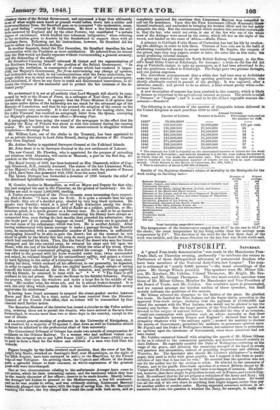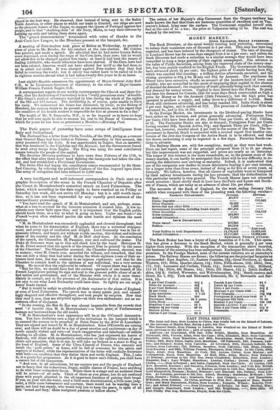POSTSCRIPT. SATURDAX.
A " grand Free-trade demonstration " was made in the Manchester Free- Trade Hall, on Thursday evening, professedly "to celebrate the return to Parliament of those distinguished advocates of commercial freedom who have been members of the National Anti-Corn-law League." The mus- ter is estimated at " nearly 3,000 persons "—the usual assemblage of the place. Mr. George Wilson presided. The speakers were Mr. Milner Gib- son, Mr. Kershaw, Mr. Cobden, Colonel Thompson, Mr. Bright, Mr. Bro- therton, and Mr. George Thompson. The two most notable speeches were those of Mr. Milner Gibson, Member for Manchester and Vice-President of the Board of Trade, and Mr. Cobden. Our available space is preoccupied, and we cannot attempt the briefest outline of these speeches, but s merely indicate the positions of the orators. Mr. Gibson adjusted his eloquence to the fashion of the place. He glorified free trade. He handled the West Indians and the Sugar-duties according to the approved Free-trade recipe; declaring that the payment of 17,000,0001. had closed the account with the West Indians, who would not be allowed to tax the country any further. But the larger portion of the Vice-President's speech was devoted to the subject of national defence. He ridiculed the idea of an invasion; "could not contemplate with patience such au odious necessity as that there should be hostilities between France and England"; declared that he had no sympathy whatever with " the military spirit"; avowed his inability to disclose the secrets of Government; permitted his audience to pronounce opinions upon Mr. Pigou's and the Duke of Wellington's letters, but exhorted them to pronounce no opinions upon the intentions of Government, since those intentions had not been stated. Mr. Cobden contented himself with adopting the speech of Mr. Milner Gibson so far as it related to the commercial questions, and devoted himself entirely to Anti-Defence. He especially assailed the Doke of Wellington—tottering on the verge of the grave, and devoting the remaining strength of his hand to create evil passions and animosities, instead of preaching forgiveness and oblivion of Waterloo, &c. The Spectator also shared Mr. Cobden's philippics--" a weekly paper, that used to write with great.gravity, but I suppose it has been so pauic- stricken of late that it has lost its wits." He asserted that the question was not one for the soldier but fur the civilian to settle. He alluded to the commerce of France, and to the pacific Free-trade speeches at a recent Reform dinner by M. Visinet and M. Cremieizz, as proving that there is no danger of invasion. He admit- ted, however, that there might be prejudices to root out in France, and even in Eng- land. He confessed that he did not propose a reduction of the Army and Navy; but declared, as an individual Member, that he should oppose any increase. He would run all the risk of his own share in anything that might happen, rather than pay for another soldier or another sailor. Having expended seventeen millions in ar- maments this year, the question is whether the Navy, for example, is really em-
ployed in the best way. He observed, that instead of being sent to the Baltic North America, or other places to which our trade is directed, our ships are sent to the pleasant waters of the Tagus, to support the Queen of Portugal against her people, and to that " skulking-hole " of the Navy, Malta, to vary their idleness by hoisting up sails and taking them down again. The " grand demonstration" terminated with votes of thanks to the Anti-Corn-law League, to the Members present at the banquet, &c.
A meeting of Free-traders took place at Bolton on Wednesday, to present a piece of plate to Mr. Brooke, for his conduct at the late election. Mr. Cobden was present, and made a speech. lie admitted that he had never known Bolton more depressed, even during the reign of the Corn-laws, than now; but he would not allow this to be charged against free trade: at least it had been the means of feeding 5,000,000, who would otherwise have been starved. If the Corn-laws had not been relaxed, America would not have altered her tariff as she had done, so as to admit our cloths. It was charged against Free-traders that they had failed to convince the world: but it surely was rather hard to be called on to do in eighteen months abroad what it had taken twenty-five years to do at home.























 Previous page
Previous page